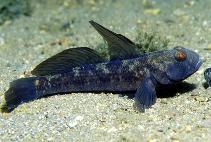| Family: |
Gobiidae (Gobies), subfamily: Gobiinae |
| Max. size: |
25.3 cm TL (male/unsexed); max. reported age: 5 years |
| Environment: |
demersal; brackish; marine; depth range 1 - 96 m |
| Distribution: |
Eastern Atlantic and Mediterranean Sea: throughout North Africa from Cape Blanc, Mauritania north and eastwards to the Suez Canal; also along the eastern Atlantic coast northwards to Trondheim (Norway) and Baltic Sea. Also known from the Black Sea (Ref. 4646). |
| Diagnosis: |
Neck scaled with a black spot in the front end of each dorsal fin (Ref. 35388); body shape is terete, slightly depressed; eyes situated dorso-laterally; reduced swim bladders (Ref. 92840). |
| Biology: |
Found in estuaries, lagoons and inshore waters over sand or mud, in seagrass or on algae (Ref. 4696). Occasionally recorded in freshwater, but there are no documented records of actual occurrence in European freshwaters (Ref. 59043). Feed on crustaceans (larger amphipods, isopods, shrimps, mysids, small crabs), bivalves, gastropods, polychaetes, chironomid larvae, sometimes small fish (Ref. 4696). |
| IUCN Red List Status: |
Least Concern (LC); Date assessed: 15 July 2014 Ref. (130435)
|
| Threat to humans: |
harmless |
Source and more info: www.fishbase.org. For personal, classroom, and other internal use only. Not for publication.

